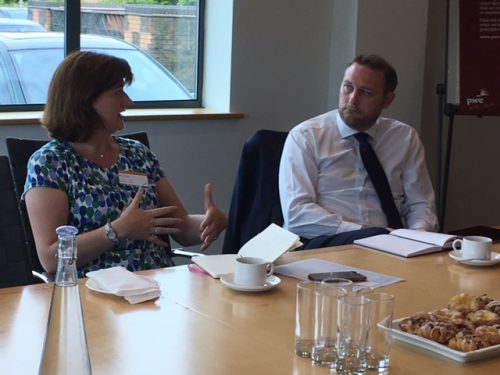Round table: Brexit – businesses need certainty to invest

What does Brexit mean for East Midlands business owners, and do they have full confidence in the government’s negotiating team? Business leaders from across the region – and one prominent local MP – came together to discuss the way forward for the East Midlands economy, post-Brexit , at a recent Barclays round table event.
What are the main challenges for businesses around Brexit?
Nicky Morgan MP: Within the prism of the General Election result, Brexit continues to be hugely divisive. Despite that we welcome the various business bodies stepping up to the plate. What we do know is that we will leave the European Union in April 2019, and we need to work towards this without undermining the economy. We have seen uncertainty and a slowdown in the economy since the Referendum vote and household debt is rising – we can’t ignore these things. But I do feel that David Davis is taking a pragmatic approach to Brexit negotiations.
It’s very difficult to know what the outcome of the negotiations will be and what new arrangement will be put in place.
There’s no time for a ‘bonfire of the red tape’ and we won’t have time before we have to leave the EU to put in place much of our own regulation.
I do feel that the voice of business hasn’t been heard loud enough, and I’d urge any East Midlands business owner, if they feel the same way, to get in touch with their local MP to voice their concerns and ideas.
Keith Ross: I think there are key themes that have come to the fore over the last year: the first is that we have some business who are concerned about free movement of labour post-Brexit, as they employ 80-90% migrant labour.
Claire Cowen: Even if tariffs don’t change, the delays exporting or importing goods will add time delays and administration costs. Businesses need to be engaging with the government to tell them this.
Jon Thompson: We’ve seen a lot of foreign labour disappear from the haulage industry since the because of the uncertainty surrounding EU migrants post-Brexit. A lot of businesses are worried that they don’t know where the labour will come to replace them.
Morgan: We should surely be using our own people – why doesn’t this happen?
Jeremy Pick: The domestic workforce has become too comfortable.
Cowen: I get the feeling we could’ve fixed the things that we found wrong with EU law without actually leaving the EU.

Keith Ross
Sandesh Jesrani: People coming from the EU are generally higher skilled than their UK counterparts. The problem we’re had in the UK for some years now is that we’ve not trained people. The government’s Industrial Strategy is disjointed, and businesses want a bigger say in the strategy.
Andrew Adey: The skills issue won’t really affect us, as we employ around 90% UK workers, but it will be interesting to see the shift, if any, in steel prices. I think success in this period is all about confidence. We supply the housebuilding industry and that has become very volatile. With this in mind, we’ve diversified into the rail sector.
Richard Blackmore: What worries me is that timeframes on other vital initiatives such as the Midlands Engine could be moved back because of the Brexit negotiations.
Morgan: I agree with this; I think all of the oxygen around Westminster is being sucked into Brexit. The government hasn’t operated properly for around 16 months because of the two General Elections and the EU Referendum, and so there are things we’ve not done for a long time.
Despite these challenges, the East Midlands economy is powering on. Why is this?
Ross: The East Midlands is a diverse economy, and its businesses have traditionally had the ability to overcome challenges.
Blakemore: I think businesses are simply getting on with it. Nothing has actually changed yet, and people are getting on with the day-to-day job of running their businesses.
Pick: One area that is undermining confidence is the squeeze on margins – the actual ability to make profit. Business owners are actually scared about the National Living Wage. £9.70 an hour is a frightening number for them.
Thompson: I agree – I don’t think business owners realise yet how much more they’re going to have to pay.
Adey: We’re concentrating on productivity and efficiency. Also, investment in key.
Ross: Investment has to be efficiency-led. There has been ambiguity around Brexit and the snap General Election, and until businesses can feel a sense of certainty there will be a reticence to invest in their businesses.
Panel:
Nicky Morgan MP
Andrew Adey, Adey Steel Ltd
Jeremy Pick, Yew Lodge Ltd
Richard Blakemore, CBI Regional Director
Jon Thompson, J T Recruit
Sandesh Jesrani, Sharman Fielding
Keith Ross, Barclays
Claire Cowen, PwC









